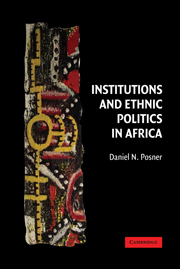III - Introduction to Part III
Testing the Argument
Published online by Cambridge University Press: 05 June 2012
Summary
Chapter 5 presented a simple model of identity choice that helps us to account for why political competition in Zambia has tended to revolve around tribal differences in one-party settings and around language group differences in multi-party settings. The chapters of Part III present a series of analyses that test several of the model's observable implications. Chapter 6 sets the stage for these analyses by addressing and ruling out competing explanations. Chapters 7 and 8 then turn to the implications of the model itself. Chapter 7 focuses on its implications for the behavior of political elites, and Chapter 8 focuses on its implications for mass voting.
It bears underscoring from the outset that the implications being tested are about the relative salience of tribal and linguistic identities in different institutional contexts, not about the salience of ethnicity per se. Some Zambian politicians run for Parliament for no other reason than because they want the attention that being a candidate brings. Others are motivated by a commitment to national service. Some voters make their electoral choices because they are swayed by a politician's credentials or record of performance. Others vote for a particular person or party because they are bribed. In the context of the extreme poverty in which elections are fought in Zambia, a bag of mealie meal, a bolt of cloth, or even a T-shirt (along with the implicit promise that more such gifts are on the way) may be enough to buy a voter's support.
- Type
- Chapter
- Information
- Institutions and Ethnic Politics in Africa , pp. 159 - 160Publisher: Cambridge University PressPrint publication year: 2005

